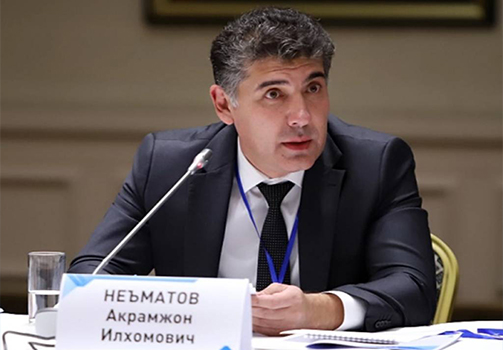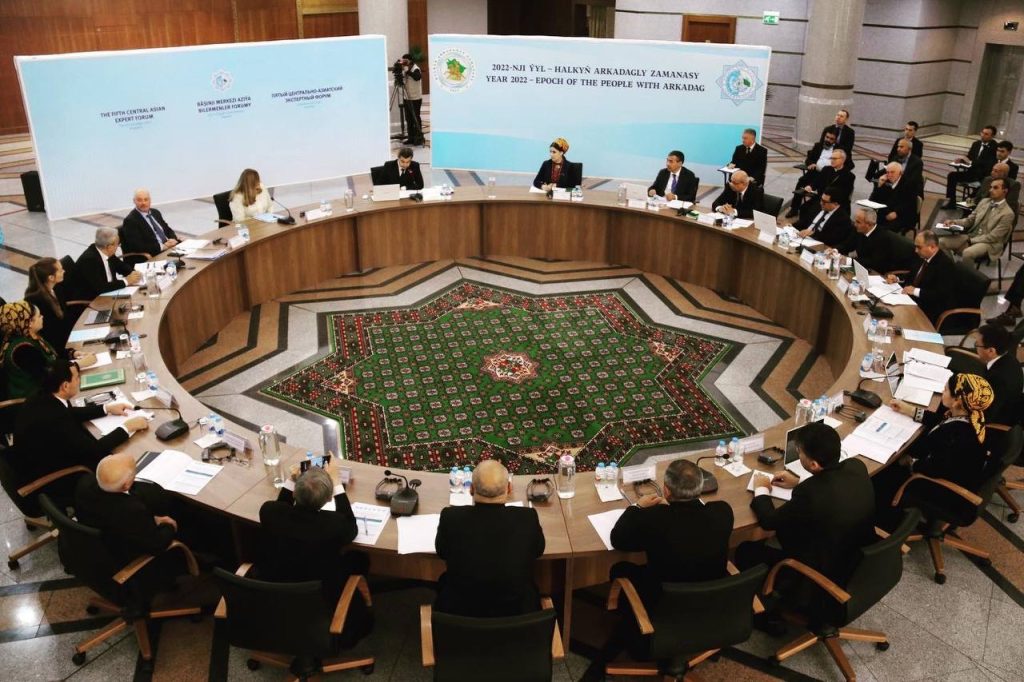Editor’s note: Akramjon Nematov, the first deputy director of the institute for strategic and interregional studies under the president of Uzbekistan (ISMI) participated in the Central Asia Experts Forum, held in Ashgabat on 10 December 2022. Here we are producing two reports from the website of ISMI about his participation in the forum. Ed.
“Central Asian countries need to develop consolidated approaches to ensure food security.” This was stated by the First Deputy Director of the Institute for Strategic and Interregional Studies under the President of the Republic of Uzbekistan Akramjon Nematov during the next Central Asian Expert Forum (CAEF) “Actual aspects of regional cooperation on climate change, water use, food security and ICT in the region Central Asia”, held on December 10 this year in Ashgabat.
The agenda of the event included issues of building up practical cooperation in the region in the field of climate change, rational use of water resources, ensuring food and information security.
During the forum, the representative of the ISMI emphasized that today CAEF has gained a stable character, has become a traditional and popular platform for expert interaction. This platform allows, in the context of a growing crisis in international political and economic relations, a lack of trust and dialogue, to consolidate the efforts of the countries of Central Asia in the joint search for mutually acceptable and adequate responses to the challenges our countries face.
Akramjon Nematov also noted that today, against the background of the negative impact on our region of geopolitical tensions, the decline in global trade, the difficulties associated with the functioning of transport communications and the restriction of access to markets, it becomes important for the Central Asian states to jointly form a regional agenda and make coordinated decisions in order to strengthening stability, security and sustainable development of the region.
In this context, the expert identified a number of problems that directly affect the interests of Central Asia, which require the consolidation of efforts and the development of common measures, in particular in the field of ensuring food security. It was noted about the observed increase in prices for a number of goods and services, and primarily for food.
As the representative of the ISMI noted, this is due to a number of factors.
First, the high dependence on food imports makes the countries of the region vulnerable to price fluctuations in external markets. This significantly affects the region, which buys from 10% to 70% of food. In 2021, the Central Asian countries imported similar goods worth $7 billion. According to the ADB, in the first half of this year, the growth in food prices in Central Asia amounted to 14.2%.
Secondly, the region is increasingly exposed to environmental degradation, which is manifested in increased rates of desertification and salinization of previously fertile soils. According to the UN, today 37% of the land in Central Asia is degraded. With a further deterioration in their condition, a reduction in crop yields by 20-40% is expected, which, in the context of population growth, can cause a food crisis.
– In such a situation, it is necessary to consolidate around the solution of specific and relevant tasks for all, since “food security is of a global nature, respectively, and it can only be supported collectively,” Akramjon Nematov noted.
Taking into account the experience of Uzbekistan, the First Deputy Director of the ISMI drew the attention of the forum participants to key areas of cooperation that will contribute to solving food security problems.
First of all, in his opinion, it is necessary to review the existing trade policy in the food sector. An important measure in this regard is the liberalization of trade in food products. At the same time, as the expert explained, harmonization of technical regulations in the field of agriculture, food and processing industries can also act as an effective mechanism for expanding trade.
Another important area, according to Akramjon Nematov, is the implementation of promising transport and communication projects. Demanded in this regard is the implementation of the project – railway “Termez – Mazar-i-Sharif – Kabul – Peshawar”, thanks to which the countries of the region will have new, alternative opportunities to enter the promising markets of South and Southeast Asia.
The representative of ISRS also stressed the need for active innovation in agri-food systems. He noted that “smart” agriculture is now becoming the most important segment of the agricultural industry, as the use of smart technologies helps to increase yields and reduce production costs. Experts predict that the introduction of new technologies will increase the productivity of world agriculture by 70% by 2050.
Akramjon Nematov also focused on the need to consolidate efforts to combat desertification, preserve biodiversity and ensure water balance, and promote green economy projects. Important measures in this regard, according to him, can be reforestation, active introduction of water-saving technologies into the agricultural sector, development and use of alternative energy sources.
Summing up his speech, A. Nematov stressed that the holding in 2023 under the auspices of FAO of the International Conference on Food Security could contribute to closer coordination of efforts in this direction. The event, initiated by the President of Uzbekistan, will allow a deeper assessment of the problems in the field of food security, develop timely and effective mechanisms to overcome them.
The event, organized by the Institute of International Relations of the Ministry of Foreign Affairs of Turkmenistan jointly with the UN Regional Center for Preventive Diplomacy for Central Asia (UNRCCA), was attended by Special Representative of the UN Secretary General, Head of UNRCCA Natalia Gherman, heads and leading experts of strategic research institutions, think tanks of countries Central Asia.
/// Institute for Strategic and Interregional Studies under the President of the Republic of Uzbekistan, 12 December 2022
There is another report about the participation of Akramjon Nematov at the CAEF in Ashgabat. Several passages in this report a repetition of the report produced above but there are several bits of information that are new to this story. Here we are producing the information that is not contained in the above report:
In this context, Akramjan Nematov drew attention to a number of problems that today require joint efforts and the development of solutions, in particular in the field of climate change, from which Central Asia is currently increasingly experiencing negative consequences.
At the same time, despite the fact that the Central Asian countries have an insignificant negative impact on the environment, climate change is occurring much faster in the region than in the rest of the world.
In particular, the average world temperature increased by 1.1°C compared to 1900, while in Central Asia this figure was 1.6°C. Moreover, in the region until 2050 the air temperature may increase by 1.5°-3°C.
These phenomena, the ISMI representative stated, are already leading to a shortage of water resources, land degradation, and an increase in the frequency of natural disasters. Thus, over the past 50 years, the amount of land covered by the process of desertification in the Central Asian countries has increased by 15-20%. In some parts of the region they are degraded from 40 to 100%. All this has a negative impact on food security.
Moreover, the Central Asian states are among the 30 countries that most acutely feel the power of water stress. In the region, the pressure on water resources significantly exceeds the world average and reaches more than 80%.
Given that water is a strategic resource, and at the same time the basis of sustainable development, the need to unite the efforts of the region to address issues of transboundary water use is becoming increasingly important.
As Akramjon Nematov noted, more effective cooperation in water resources management will contribute to the socio-economic development of the region. According to the World Bank forecasts, the implementation of effective water policies in Central Asia will lead to GDP growth by 6% by 2050.
Speaking about response measures to the above trends, the expert stressed that the issues of combating climate change are of a transboundary, global nature. In this regard, the Central Asian countries should consolidate and take an active part in global efforts to mitigate the negative consequences of climate change and keep the average temperature increase within 1.5 degrees.
At the same time, the representative of ISMI explained, the ongoing processes of global warming are practically impossible to contain, they are irreversible. Under these conditions, it is important to adapt to the new natural and climatic conditions that are being formed as a result of climate warming.
These measures should include an accelerated transition to a “green economy”, the active introduction of energy efficient technologies and renewable energy sources. An important contribution in this direction will also be the adaptation of agriculture to new climatic conditions. In particular, it is necessary to work on the selection of high-yielding agricultural crops that are resistant to harsh climates.
At the same time, as the Deputy Director of ISMI noted, the above measures are costly and update the attraction of climate finance. So for ten years, from 2011 to 2021, the countries of the region received about 0.5 billion dollars for projects related to climate problems. While East Asia, North America, Western Europe received 100-200 times more.
In order to increase the volume of climate investments, the countries of Central Asia should develop new approaches to public-private partnerships, attracting international financial institutions.
All this actualizes the implementation of a coordinated adaptation policy in Central Asia. According to the expert, the first step in this direction will be the adoption of the UN Regional Strategy on Adaptation to Climate Change, which will allow consolidating the efforts of the Central Asian countries to develop common approaches and standards in mitigating the effects of climate change
The adoption of the Green Agenda regional program for Central Asia initiated by Uzbekistan following the results of the Consultative Meeting in Cholpon-Ata was also evidence of the strong commitment of the countries of the region to work in the field of adaptation to climate change. This is a framework document that defines the main areas of interaction between the countries of the region. Meanwhile, in order to implement the program, it is necessary to adopt a Plan of Specific Actions as soon as possible.
In general, “the implementation of the above initiatives and proposals will help unite the efforts of the countries of the region, serve to further improve the environmental situation, and also lay the foundation for the sustainable development of Central Asia,” Akramjon Nematov concluded./// Institute for Strategic and Interregional Studies under the President of the Republic of Uzbekistan, 12 December 2022

